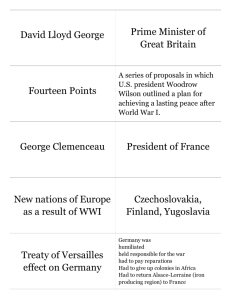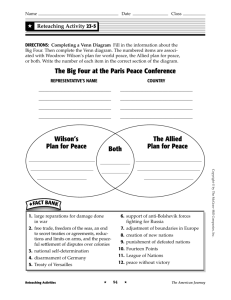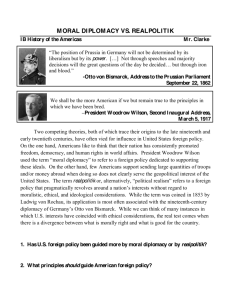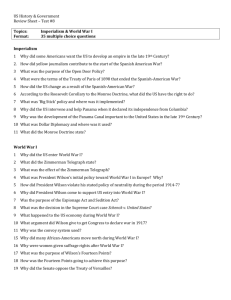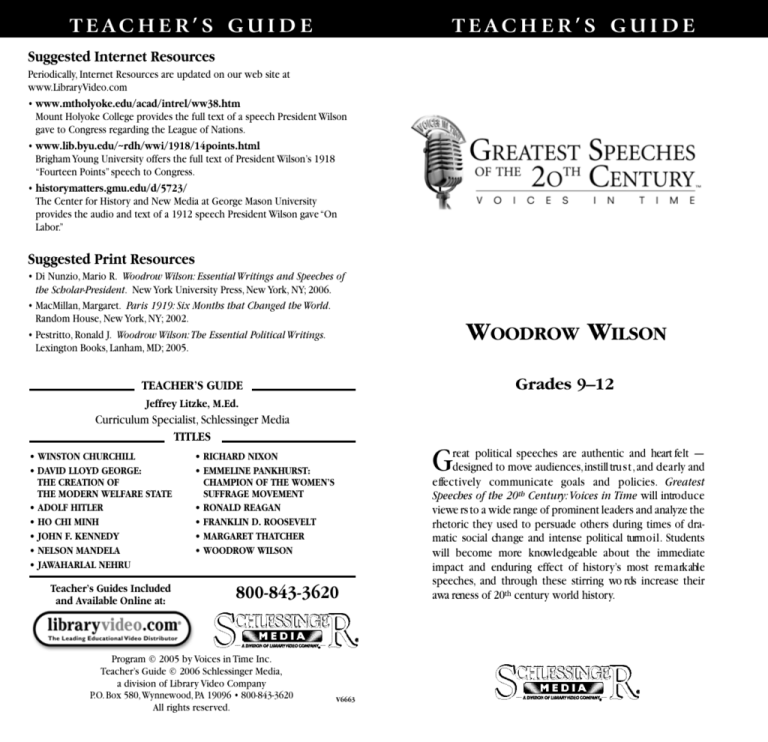
TEACHER’S GUI DE
TEACHER’S GUI DE
Suggested Internet Resources
Periodically, Internet Resources are updated on our web site at
www.LibraryVideo.com
• www.mtholyoke.edu/acad/intrel/ww38.htm
Mount Holyoke College provides the full text of a speech President Wilson
gave to Congress regarding the League of Nations.
• www.lib.byu.edu/~rdh/wwi/1918/14points.html
Brigham Young University offers the full text of President Wilson’s 1918
“Fourteen Points” speech to Congress.
• historymatters.gmu.edu/d/5723/
The Center for History and New Media at George Mason University
provides the audio and text of a 1912 speech President Wilson gave “On
Labor.”
Suggested Print Resources
• Di Nunzio, Mario R. Woodrow Wilson: Essential Writings and Speeches of
the Scholar-President. New York University Press, New York, NY; 2006.
• MacMillan, Margaret. Paris 1919: Six Months that Changed the World.
Random House, New York, NY; 2002.
• Pestritto, Ronald J. Woodrow Wilson: The Essential Political Writings.
Lexington Books, Lanham, MD; 2005.
WOODROW WILSON
Grades 9–12
TEACHER’S GUIDE
Jeffrey Litzke, M.Ed.
Curriculum Specialist, Schlessinger Media
TITLES
• WINSTON CHURCHILL
• DAVID LLOYD GEORGE:
THE CREATION OF
THE MODERN WELFARE STATE
• ADOLF HITLER
• HO CHI MINH
• JOHN F. KENNEDY
• NELSON MANDELA
• JAWAHARLAL NEHRU
Teacher’s Guides Included
and Available Online at:
800-843-3620
Program © 2005 by Voices in Time Inc.
Teacher’s Guide © 2006 Schlessinger Media,
a division of Library Video Company
P.O. Box 580, Wynnewood, PA 19096 • 800-843-3620
All rights reserved.
reat political speeches are authentic and heart felt —
designed to move audiences,instill tru s t ,and clearly and
e ffe c t i vely communicate goals and policies. Greatest
Speeches of the 20th Century:Voices in Time will intro d u c e
viewe rs to a wide range of prominent leaders and analyze the
rhetoric they used to persuade others during times of dramatic social change and intense political turm o i l . Students
will become more knowledgeable about the immediate
impact and enduring effect of history’s most re m a rk able
speeches, and through these stirring wo rds increase their
awa reness of 20th century world history.
G
• RICHARD NIXON
• EMMELINE PANKHURST:
CHAMPION OF THE WOMEN’S
SUFFRAGE MOVEMENT
• RONALD REAGAN
• FRANKLIN D. ROOSEVELT
• MARGARET THATCHER
• WOODROW WILSON
V6663
Historical Overview
President Woodrow Wilson’s policy of keeping the United States out of the disa s t rous Great War in Europe was wildly popular with the A m e rican people
and led to his reelection in 1916.Withering German U-boat attacks on United
States shipping revealed that America’s neutrality was not absolute, and after
the Zimmerman telegraph, the president used his oratorical skills to convince
America that the time had come to enter the conflict. President Wilson’s confident manner and passion for the art and science of public speaking we re
skills he would use in 1917 to prepare young men for the draft and persuade a
vast majority of Congress to vote for an unprecedented mobilization effort.
Time Line
1856 — Woodrow Wilson is born in Staunton,Virginia.
1912 — Woodrow Wilson is elected president of the United States.
1914 — Archduke Franz Ferdinand is assassinated;World War I begins.
1915 — British passenger liner Lusitania is sunk.
1916 — Woodrow Wilson is reelected president of the United States.
1917 — President Wilson asks Congress for a declaration of war against
Germany.
1918 — World War I ends.
1919 — President Wilson presents his Fourteen Points proposal at the Paris
Peace Conference.
1919 — Woodrow Wilson wins the Nobel Peace Prize.
1924 — Woodrow Wilson dies at age 67.
Vocabulary
Allied Powers — The group of nations, led at the outset by Great Britain,
France and Russia, that were allied to fight against the Central Powers during
World War I.
isolationist — An advocate of a policy of non-intervention or neutrality that
the United States had taken to stay out of world conflicts prior to World War I.
Civil War — A major war in the United States between 1861 and 1865 in
which northern states battled southern states that were attempting to leave
the Union.
Lusitania — A British ocean liner carrying American civilians, foreign troops
and munitions that was torpedoed and sunk by a German submarine in 1915.
U-boat — The German submarine used to attack American and Allied ships
in World War I.An abbreviation for “undersea boat.”
Zimmerman Note — A telegram sent by Germany that instructed the
German ambassador in Mexico to propose an alliance with Mexico against
the United States during World War I.The intercepted message convinced
many previously isolationist Americans to join the Allied side.
Bull Moose Party — The political party founded by Theodore Roosevelt to
enable him to run as a third party candidate in the election of 1912.Also
known as the Progressive Party.
Fourteen Points — President Woodrow Wilson’s proposals for an eventual
and lasting peace after World War I, which became the basis of the 1919
Treaty of Versailles.
(Continued)
The League of Nations — An organization of countries created to settle
international disputes, based on President Woodrow Wilson’s Fourteen Points.
Treaty of Versailles — The 1919 peace treaty signed by the Allied Powers
and Germany after World War I.The treaty contained a “war guilt” clause,
forcing Germany to pay the victors billions of dollars in war reparations.
Nobel Peace Prize — An international award presented annually to the
person who does the most to preserve world peace.
World War II — The second major war of the 20th century that involved the
Allied Powers led by England, France, the Soviet Union and the United States
who fought the Axis Powers, which included Germany, Japan and Italy.
United Nations — An organization founded in 1945 that works to ensure
world peace.
Discussion Questions
1.Why did America’s Founding Fathers advocate an isolationist path?
2.What was President Wilson’s campaign slogan in his reelection campaign?
3. How did President Wilson respond to German U-boat attacks prior to 1917?
4.What was the Bull Moose Party?
5.What tradition did Woodrow Wilson reinstitute as president?
6. How did America mobilize and prepare its forces for the war effort?
7.What was the main goal of President Wilson’s Fourteen Points?
Discussion Questions & Activities
• Read with your class President Wilson’s final address given on his nationwide tour to promote the League of Nations.What “false impressions” about
the League of Nations and the Versailles Treaty did he attempt to clarify? Ask
students to explain and evaluate his argument for U.S. membership in the
League.As an extension, students may research and role-play debate in the
U.S. Senate regarding the treaty’s ratification.The full text of Wilson’s
address may be found at this web site:
www.americanrhetoric.com/speeches/wilsonleagueofnations.htm
• President Wilson was an ally of the Progressive Movement, which was
formed in response to major social problems left in the wake of the
nation’s unbridled industrial expansion and the abuses of corporate
monopolies. Read President Wilson’s 1913 inaugural speech and analyze his
tone, use of language and administration goals.The full text of Wilson’s
speech may be found at the following web site:
www.yale.edu/lawweb/avalon/presiden/inaug/wilson1.htm
• President Wilson went into seclusion for a week in preparation for asking
Congress and the American people to make the ultimate sacrifice in World
War I.Ask students to read Wilson’s War Message and summarize his reasons
for leading “this great peaceful people into war, the most terrible and
disastrous of all wars.”The full text of his speech may be found at the
following web site:
usa.usembassy.de/etexts/speeches/rhetoric/wwwar.htm

